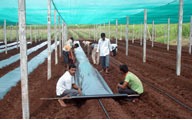
Integrating Farmers into Commercial Supply Chains
ACDI/VOCA implemented USAID’s first enterprise development project in India, the 4-year India Growth-Oriented Microenterprise Development Program (GMED) under the Accelerated Microenterprise Advancement Project (AMAP). GMED was an innovative program that developed sustainable and scalable approaches to job creation by fostering the growth of micro and small enterprises (MSEs). GMED’s components included agribusiness and urban services. The agribusiness component focused on fruits and vegetables, organically certified food products, maize value chain improvement, and the integration of HIV/AIDS-affected communities into commercial supply chains. The urban services component worked to improve municipal solid waste management through outsourcing to MSEs. GMED was solely a technical service program and had no grant or subsidy component, making it unique for a donor project.
Strengthening the Value Chain through Partnerships
GMED adopted a value chain approach to enterprise development following the principle that the growth of micro and small enterprises must be driven by sustainable growth strategies for all of the firms in a value chain. ACDI/VOCA developed partnerships with larger firms and nongovernmental organizations (NGOs), which then provide embedded business development services to associated MSEs as an integral part of their commercial transactions. Thus, GMED was a service facilitator, rather than a service provider. The ultimate goal of the project was to enhance MSE growth opportunities by expanding the scope of the embedded services being provided by corporate and NGO partners, helping to make them more effective.
Developing Maize-Processing Technology
ACDI/VOCA worked with a major multinational company and a large Indian corporation to strengthen ties between farmers and maize users and to introduce technology for improving farmer productivity and product quality. GMED’s industry partner, the largest Indian feed milling firm, set up village collection centers in maize-producing regions to facilitate transactions with farmers. GMED-trained commission agents aggregated the crop and ensured its delivery to the collection centers. In conjunction with the multinational organization, GMED provided technical extension services to the maize farmers. The benefits of the new system include improved maize quality assurance from miller control of threshing, drying, storage and handling; increased maize productivity; and forging of ongoing links between producers and buyers.
Organically Certified Food Component
In the organically certified foods subcomponent, GMED helped two large NGOs establish commercial marketing subsidiaries, improve their management and processing procedures, and link with more profitable markets. The NGOs have effectively organized and obtained organic certification for several thousand small, marginal, mostly women farmers. GMED guided the development of the NGOs’ skills to effectively market the certified products. GMED also assisted a corporate exporter of organically certified products in improving its productivity and product quality and planning a product diversification program.
Solving Waste Management Problems and Benefiting the Informal Sector
The Supreme Court of India ruled several years ago that all municipalities must improve the efficiency of their solid waste management programs or face severe penalties. Most municipal governments, however, lacked the experience and knowledge required to obtain these services. GMED filled that gap through its solid waste management subcomponent, which provided training and guidance to municipal governments in three states for the outsourcing of solid waste management activities to MSEs. GMED’s outsourcing tool kit has been introduced to at least 40 municipal governments and was chosen as an implementing instrument by other donors, including the World Bank. At least 15 municipalities have been assisted by GMED in the outsourcing of solid waste management activities to MSEs. These programs represent opportunities for workers in the informal sector, such as rag pickers, street sweepers, etc., to gain formal employment with the contracted MSEs.
In its third year of implementation, GMED concentrated its activities exclusively on the agribusiness component, specifically in the fresh fruit and vegetable (FFV) subsector because of the emerging promising opportunities represented by the rapid growth of the organized retail sector and the growing demand for fruit and vegetables by the export sector.
Linking Smallholder Fruit and Vegetable Farmers to Retail Food Sector Markets
Under the fruit and vegetable component, GMED helped several major Indian corporations and larger NGOs integrate smallholder farmers into commercial supply chains by increasing their capacity to meet market demand. Although starting from a very small base, the organized retail food sector in India was experiencing rapid growth. The proliferation of supermarkets and hypermarkets throughout the country created substantial demand for reliable supplies of high-quality fresh produce. This growing demand represented significant potential for smallholder fruit and vegetable farmers, who account for the great majority of fruit and vegetable production in India—provided that these farmers can gain the ability to produce to market specifications. GMED helped two of its principle corporate partners, ITC, Ltd., and Radhakrishna Foodland, to establish three model smallholder vegetable farmer production bases to illustrate the measures required to accomplish this. ITC, Ltd., plans to scale up the model to cover 20,000 to 30,000 smallholder farmers throughout the country during the next 4 years, and Foodland has found a reliable source of fresh and fresh-cut produce in Nandani, a cooperative that was assisted by GMED for the last 2 years of the project. GMED successfully initiated a program to help the 5,400-member Nandani Cooperative to improve farmer productivity and produce quality, develop supply chain infrastructure, and link members to high-value organized retail and export markets.
In addition, ACDI/VOCA worked with several Indian NGOs and larger corporations to rationalize fresh and processed mango value chains. The project improved farmer productivity and product quality and addressed other value chain gaps in the post-harvest and marketing sectors. GMED organized several smallholder farmer clusters in an HIV/AIDS-affected area to join commercial vegetable supply chains, based on an assured market for their products.
ACDI/VOCA and GMED demonstrated commercially viable solutions to MSE growth constraints through development of these models, inspiring other industry participants to adopt them. This bodes well for the sustainability and scalability of GMED efforts, benefiting SMEs and the industries involved through enhanced competitiveness and greater growth opportunities in India.
PDF version of profile (606 KB)





